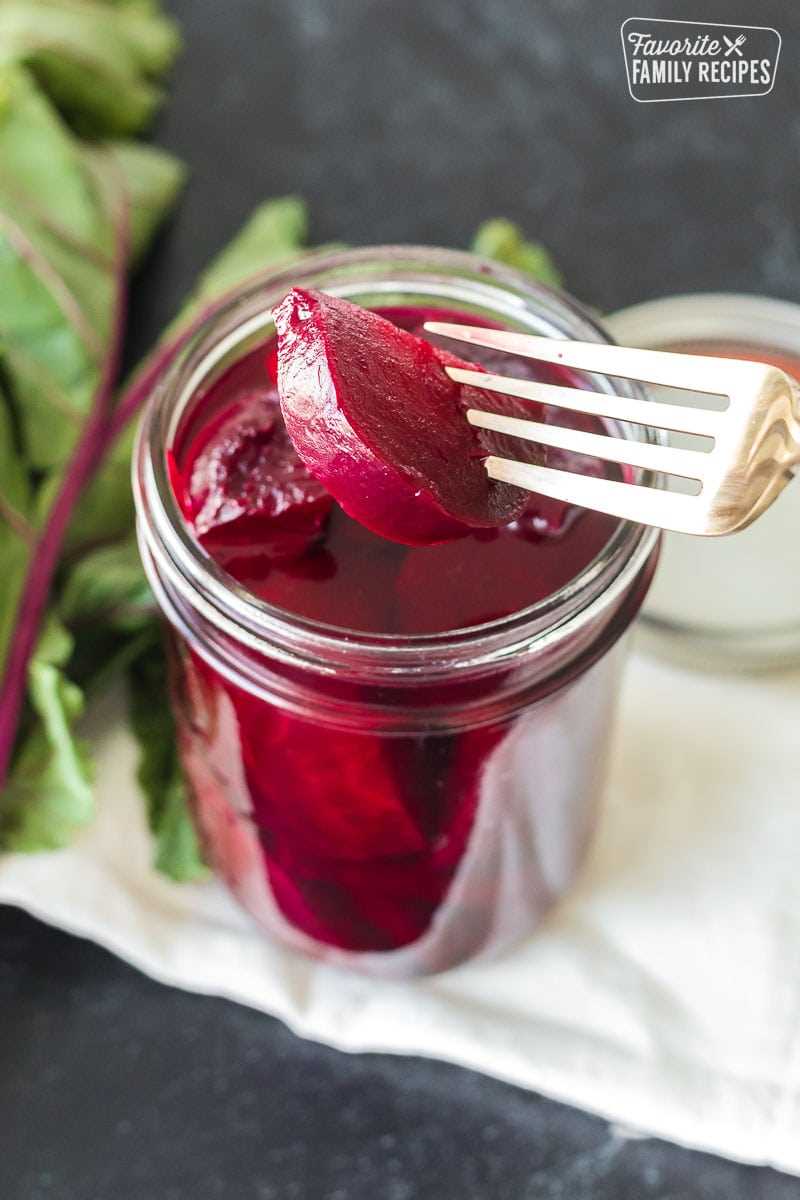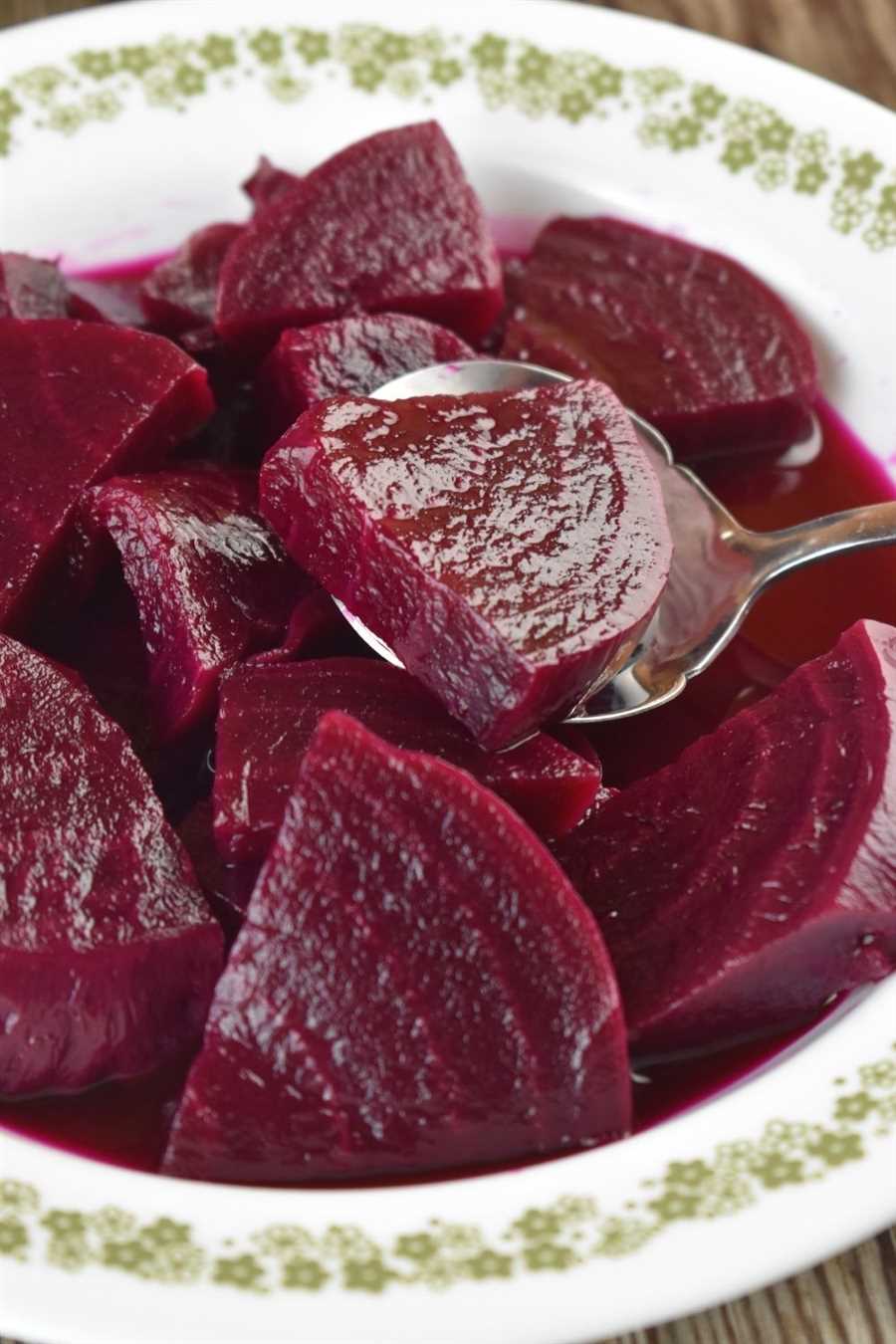





Beets are a versatile vegetable that can be enjoyed in a variety of ways. One popular method of preparing beets is pickling, which preserves their vibrant color and tangy flavor. But do you cook beets before pickling them? The answer is yes, beets need to be cooked before they can be pickled.
Before you start the pickling process, you will need to cook the beets to soften them and bring out their natural sweetness. There are several methods you can use to cook beets, including boiling, roasting, or steaming. The cooking method you choose will depend on your personal preference and the equipment you have available.
Boiling is a common cooking method for beets. To boil beets, simply place them in a pot of water and bring it to a boil. Cook the beets for about 30-45 minutes, or until they are fork-tender. Once the beets are cooked, you can remove them from the boiling water and let them cool before peeling and slicing them for pickling.
Roasting is another popular cooking method for beets. To roast beets, preheat your oven to 400°F (200°C). Place the beets on a baking sheet and drizzle them with olive oil, salt, and pepper. Roast the beets for about 60 minutes, or until they are tender. Once the beets are roasted, allow them to cool before peeling and slicing them for pickling.
If you prefer a more delicate and less intense flavor, you can steam the beets instead of boiling or roasting them. To steam beets, place them in a steamer basket over a pot of boiling water. Steam the beets for about 30-45 minutes, or until they are fork-tender. Once the beets are steamed, let them cool before peeling and slicing for pickling.
Once the beets are cooked and prepared, you can proceed with the pickling process. Pickled beets can be stored in the refrigerator for several weeks and make a delicious addition to salads, sandwiches, or enjoyed on their own as a tangy and nutritious snack.
The art of pickling vegetables
Pickling vegetables is not only a delicious way to enjoy their flavors, but it’s also a tried and true method of food preservation. The process of pickling involves immersing vegetables in a brine or vinegar solution, which not only enhances their shelf life but also gives them a tangy and crisp taste.
One of the most popular vegetables to pickle is beets. These vibrant and earthy root vegetables can be pickled to create a delightful side dish or addition to salads and sandwiches. But do you cook beets before pickling?
The process of pickling beets

Before pickling beets, they need to be cooked to achieve the desired texture and flavor. The most common method of cooking beets for pickling is by boiling or roasting them. Boiling beets in water helps to soften their hard texture and make them more suitable for pickling. Roasting, on the other hand, enhances their natural sweetness and adds a depth of flavor.
Once the beets are cooked and cooled, they can be peeled and sliced or cubed according to your preference. It’s important to note that you should handle them with care to prevent staining your hands and surfaces, as beets have a deep red color that can be difficult to remove.
Pickling beets

After preparing the beets, it’s time to pickle them. The pickling process typically involves combining a brine, which is a mixture of vinegar, water, sugar, and spices, and heating it until the sugar dissolves. The beets are then added to the hot brine and allowed to marinate for a period of time, usually a few hours or overnight, to fully absorb the flavors.
Once pickled, beets can be stored in the refrigerator for several weeks. The longer they marinate, the more pronounced the flavors become. Pickled beets can be enjoyed on their own as a snack, added to salads or sandwiches, or used as a colorful garnish for various dishes.
Pickling vegetables, like beets, is not only a great way to preserve their freshness but also a creative way to enhance their taste. With a little time and effort, you can enjoy the tangy and vibrant flavors of pickled beets in your meals throughout the year.
History of pickled beets
Pickled beets have a long history and are enjoyed in various cuisines around the world. These tangy and sweet snacks are made by brining or fermenting beets in a mixture of vinegar, sugar, and spices. The process of pickling helps to preserve the beets and enhance their flavor.
The origin of pickled beets
The exact origin of pickled beets is unknown, but they have been a popular dish for centuries. It is believed that pickling as a preservation method originated in ancient Mesopotamia, around 2400 BC. Since then, it has spread throughout Europe and other parts of the world.
In the Middle Ages, pickled beets became a staple in many European countries, including England, Germany, and Russia. They were especially popular during the winter months when fresh vegetables were scarce. Pickled beets were not only a way to preserve food but also a way to add flavor and variety to meals.
The health benefits of pickled beets
In addition to being delicious, pickled beets also offer several health benefits. Beets are a rich source of vitamins and minerals, including folate, manganese, and potassium. They are also high in dietary fiber, which can aid in digestion and promote a healthy gut.
Furthermore, beets contain a compound called betaine, which has been linked to improved cardiovascular health. Pickling beets can help to retain these beneficial nutrients, making them a nutritious and tasty addition to any meal or snack.
Conclusion
The history of pickled beets spans centuries and has become a beloved dish in many cultures. Whether enjoyed as a side dish, salad ingredient, or sandwich topping, pickled beets offer a tangy and sweet flavor that complements a variety of foods. Furthermore, their numerous health benefits make them a nutritious and satisfying choice. So, next time you reach for that jar of pickled beets, remember the long history and tradition behind this delicious treat.
Why pickle beets?
Pickling beets is a popular method of preserving them to enjoy their unique flavor and nutritional benefits throughout the year. Pickling not only extends the shelf life of beets but also enhances their taste and makes them a versatile ingredient.
Flavor: Pickled beets have a delicious tangy and slightly sweet flavor that adds a unique twist to dishes. The pickling process infuses the beets with vinegar, spices, and other seasonings, creating a distinctive taste that pairs well with various cuisines.
Longer Shelf Life: By pickling beets, you can prolong their storage life and enjoy them long after their peak season. Properly pickled beets can be stored in the refrigerator for several months, allowing you to savor their flavors whenever you desire.
Versatility: Pickled beets can be used in a variety of culinary creations. They can be enjoyed alone as a side dish, added to salads, sandwiches, or wraps for an extra zing, or incorporated into appetizers and main courses for added flavor and texture.
Nutritional Benefits: Beets are known for their various health benefits, including boosting stamina, supporting liver function, and reducing inflammation. Pickled beets retain many of these nutritional properties, providing you with a convenient and tasty way to incorporate them into your diet.
In conclusion, pickling beets is a fantastic way to preserve their flavor, increase their shelf life, and add a unique taste to various dishes. By pickling beets, you can enjoy their tangy and sweet flavors throughout the year while benefiting from their nutritional properties.
Health benefits of pickled beets
Pickled beets not only add a burst of flavor to your meal, but they also come with several health benefits. Here are a few reasons why you should consider adding pickled beets to your diet:
1. Rich in nutrients: Pickled beets are packed with essential vitamins and minerals, including vitamin C, folate, potassium, and iron. These nutrients play a crucial role in maintaining overall health and well-being.
2. Source of antioxidants: Beets are rich in antioxidants, which help protect the cells from damage caused by harmful free radicals. The pickling process enhances the antioxidant content of beets, making pickled beets an excellent source of this vital compound.
3. Digestive health: The high fiber content in pickled beets can promote healthy digestion and prevent constipation. Fiber also helps maintain a healthy gut by feeding beneficial gut bacteria.
4. Blood pressure regulation: Beets are known for their ability to lower blood pressure due to their high nitrate content. The pickling process retains these beneficial compounds, making pickled beets an effective natural remedy for hypertension.
5. Boosts energy levels: The nitrates present in pickled beets can enhance blood flow and oxygen delivery to the muscles, improving energy levels and endurance. This makes pickled beets a great addition to the diet of athletes and active individuals.
6. Supports liver function: The betaine present in pickled beets can help support liver function and promote detoxification. Including pickled beets in your diet can help maintain a healthy liver.
Incorporating pickled beets into your meals or enjoying them as a side dish can provide you with these amazing health benefits. However, it is important to consume them in moderation due to their high sugar content, especially if you have diabetes or are watching your calorie intake.
Questions and answers
Do you need to cook beets before pickling them?
Yes, it is recommended to cook beets before pickling them. Boiling or roasting the beets softens them and enhances their flavor, making them more suitable for pickling.
What is the best way to cook beets before pickling?
There are different methods to cook beets before pickling. One common way is to wrap them in foil and roast them in the oven until they are tender. Another popular method is to boil the beets in water until they are easily pierced with a fork. Both methods work well and it depends on personal preference.
Can you pickle raw beets without cooking them?
Pickling raw beets without cooking them is possible, but it is not recommended. Cooking the beets before pickling softens them and helps infuse the flavors of the pickling brine. Raw beets may not have the same texture and taste as properly cooked beets when pickled.
How long do you need to cook beets before pickling?
The cooking time for beets can vary depending on their size and the cooking method used. Boiling beets typically takes around 30-45 minutes, while roasting them in the oven can take anywhere from 45 minutes to 1 hour. It is important to cook them until they are easily pierced with a fork or knife.
Do I need to peel the beets before pickling?
Yes, it is recommended to peel the beets before pickling them. The skin of the beets can be tough and may not pickle well. Peeling the beets also helps remove any dirt or impurities that may be present on the outer skin.
Should I cook beets before pickling them?
Yes, it is recommended to cook beets before pickling them. Cooking helps to soften the beets and enhance their flavor.






